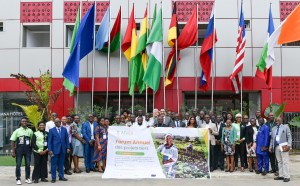
The International Centre of Insect Physiology and Ecology (icipe), Nairobi, and the Université Félix Houphouët-Boigny (UFHB), Abidjan, jointly hosted the second Annual Implementers Forum (AIF) for the Accelerating Inclusive Green Growth through Agri-based Digital Innovation in West Africa (AGriDI) project from 11-15 September 2023 in Abidjan, Cote d’Ivoire. AGriDI is one of the 12 Innovation Fund projects financed by the European Union through the ACP Innovation Fund of the Organization of African, Caribbean and Pacific States (OACPS) in 2021, and is implemented by an icipe-led consortium in five countries namely; Benin, Burkina Faso, Côte d’Ivoire, Ghana, and Nigeria. EU’s contribution to the AGriDI project is Euros 4.2 million over four years.
AGriDI develops digital technologies that enhance crop and livestock production, and links farmer’s produce to market opportunities. AGriDI also supports the development of policies to create an enabling environment for adoption of digital innovations. Its focus is on creating job opportunities for youth andwomen, while addressing climate change.

“UFHB is delighted to co-host the second forum for AGriDI project implementers and stakeholders. As a university, it is an opportunity to match our research, knowledge and skills with the realities of agricultural production and marketing”, says Prof BALLO Zié, President, UFHB.
AGriDI project is designed and implemented as part of the innovation window of the Regional Scholarship and Innovation Fund (Rsif) of the Partnership for skills in Applied Sciences, Engineering and Technology (PASET), of which Cote d’Ivoire is a participating country. UHFB is one of the 15 African Host Universities participating in the Rsif. It hosts 22 Rsif PhD scholars on climate change and is implementing projects on sustainable agriculture.
In West Africa, 66% of employment is in the agri-food sector (68% of them being women), according to the African Union Commission and the OECD latest assessment of investments in sustainable development in Africa. However, majority of the employment in the sector is informal, crop and livestock productivity is sub optimal, value addition is low and links to markets for farm produce are also weak. Climate change also threatens agricultural productivity and livelihoods. Therefore, digitalising the agri-food sector is one way to address some of these challenges. Digitalisation creates new propects for decent jobs, promotes more sustainable farming practices, enhances profitability and attractiveness of agribusinesses for the youth, and supports efforts to mitigate and adapt to climate change.
The AGriDI project is contributing to the sustainability and profitability of the agri food sector in the ECOWAS. AGriDI’s objective is to create a conducive environment for agri-based digital innovations, especially for women and youth farmers, and accelerating inclusive green growth in the targeted countries of West Africa. Its specific objectives are: a) increased uptake of agri-based digital technologies by farmers’ cooperatives and SMEs; b) strengthened collaboration between research communities, industry, and policy actors in digital innovations, and c) improved knowledge on policymaking facilitating scaling agri-business digital innovations. AGriDI project consortia comprises of partners from academia, industry, government and smallholder farming communities, using outputs of research and technology to create sustainable agribusiness opportunities.
Partners in the AGriDI project are developing products and digital solutions like the AGriCef mobile App by Université de Parakou used to control the Fall armyworm (FAW) in maize in Northern Benin and the Ki@ App, also in Benin, that collects and provides relevant market updates via SMS and voice message directly to local farmers on their mobile phones. In South-Western Nigeria a SMARTSOIL App by the Federal University of Agriculture, Abeokuta (FUNAAB) that is using digital soil mapping and artificial intelligence techniques to provide hyper-local soil information in a way that is easily accessible and affordable to end-users; and in Ghana, the Driving Market Access and Managing AG value chains (DigiMakt) is being used to profile, and disseminate climate smart agronomic advisory, market information, weather alerts, insurance, and credit scoring for over 12,500 smallholder farmers for financial inclusion in Bono East and Oti regions. DigiMakt was developed by Esoko Ltd., winner of the Agri-Tech Company of the Year Award at the Ghana Agriculture and Agri-Business Awards 2023. Other projects are supporting development of policies on digital innovations in the region.
“The future of farming in Africa will require a high level of digital literacy and competence in our farming communities and businesses. The EU’s support through AGriDI is enabling us to digitalise agriculture and promote sustainable farming practices in the continent,” says Dr Segenet Kelemu, Director General & CEO, icipe. “In this three-day forum, we bring together experts in digital innovations, policy makers, academics, development partners, and business leaders to discuss key milestones of the AGriDI project, and next steps in scaling the solutions and plans for their sustainability,” continues, Dr Kelemu.
On a broader scale, AGriDI is contributing to the implementation of ECOWAS’ regional and national development policies and strategies, especially those related to science and digital innovations. Its contribution is also aligned with the aspirations of the African Union Agenda 2063 of a transition to a modern and sustainable economy, as well as the UN Sustainable Development Goals on gender, food, energy, innovation, and global partnerships. Further, AGriDI demonstrates the practicality of implementing the new Africa-EU Innovation Agenda (published in July 2023), which prioritises cooperation in public health, green transition, innovation and technology, and capacities for science.
The AIF explored synergies, and mutually beneficial partnerships for the successful implementation of digital innovation initiatives in the ECOWAS, and the rest of the continent.




